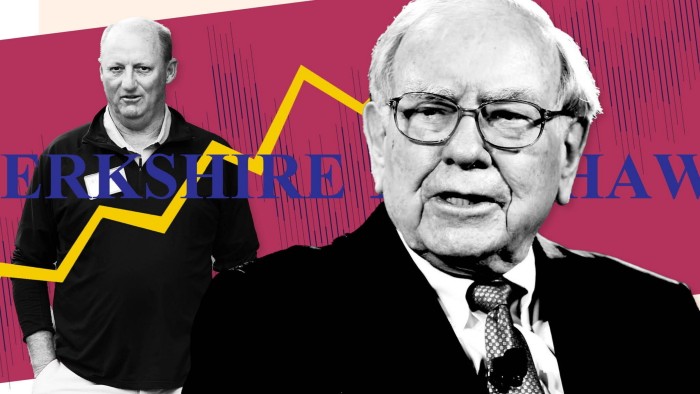Share this @internewscast.com
Stay informed with free updates
Berkshire Hathaway experienced a $3.8 billion loss as it significantly reduced its valuation of its investment in Kraft Heinz during the second quarter, a move that highlighted the challenges Warren Buffett faced with his notable 2015 consumer goods acquisition.
Berkshire announced that it had reduced the book value of its 27.4% ownership in Kraft Heinz to $8.4 billion, down from $13.5 billion at the close of the first quarter, indicating a depreciation of roughly $5 billion. The impact of this reduction decreased its post-tax earnings by $3.8 billion, as stated in the quarterly report.
This marks the second occasion on which Berkshire has diminished the valuation of the enterprise, known for its Heinz Ketchup and Kraft Macaroni & Cheese products, following a $3 billion deduction in 2019.
Kraft Heinz is now contemplating a division of its operations as its board and leadership aim to enhance the company’s value. The company’s stock has underperformed compared to the larger market since the merger of Heinz, which Berkshire co-owned with investment firm 3G Capital, and publicly-traded Kraft.
The company from Omaha mentioned on Saturday that it had evaluated “our capacity and willingness to retain the investment until its market value surpasses book value, the extent and duration of the decline in market value, and the company’s operating performance and financial status” in making the decision to record the writedown.
The company had refrained from recognizing a depreciation on the investment for a considerable period, despite Kraft Heinz shares trading below the value Berkshire had assigned the investment in its records.
The disclosure came in second-quarter results that showed the sprawling conglomerate sold a net $3bn-worth of stocks in the quarter, the 11th consecutive period in which sales outpaced new investments in listed equities.

The cuts to its $268bn stock portfolio came during a period marked by heightened volatility in the financial markets and suggested that the so-called Oracle of Omaha saw few worthwhile investment opportunities even as other investors bid shares of companies in the S&P 500 index to new heights.
Berkshire’s cash and short-term Treasury position fell by $3.6bn from the end of the first quarter, to $344bn, in part because Buffett had previously borrowed money to invest in US government debt. Excluding that, the underlying value of its cash pile increased by nearly $11bn in the quarter.

The company also disclosed it did not buy back any of its stock during the period, the fourth consecutive quarter it refrained from repurchasing shares.
“Berkshire’s cash balances remain elevated as Buffett stayed on the sidelines,” said Kyle Sanders, an analyst at Edward Jones.
Operating earnings among the company’s various subsidiaries from industrials to railroads fell by 3.8 per cent from a year earlier, to $11.2bn. That surpassed Wall Street’s expectations of a 7 per cent decline, according to Visible Alpha.
Operating earnings has long been Buffett’s preferred performance metric, as it strips out swings in the value of its stock portfolio. Total net income fell to $12.4bn from $30.4bn last year, reflecting the Kraft Heinz impairment and large investment gains in 2024.
The quarterly report identified challenges across Berkshire’s scores of businesses, with profitability at its core insurance unit sliding 12 per cent. Berkshire attributed much of the drop to its commercial and small business insurer Guard, which has been exiting business lines and tightening underwriting standards.
Revenues at its railroad BNSF increased only marginally, as higher coal shipments offset declines in shipping consumer and industrial goods across the country.
Investors have been waiting to see if BNSF would respond to recent consolidation in the rail industry after rival Union Pacific agreed to buy Norfolk Southern. Any decision would be shaped by both Buffett and Greg Abel, the man who is set to succeed him.
Abel, who oversees all of Berkshire’s non-insurance businesses, will become Berkshire’s chief executive on January 1, 2026, Buffett announced in May.
Berkshire’s share price has lagged the benchmark S&P 500 index since Buffett announced his intention to step down as chief executive at the end of this year. The company’s high-vote class A shares have fallen 12 per cent since the announcement in May, compared with a 10 per cent gain across the S&P 500.









